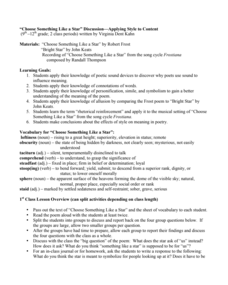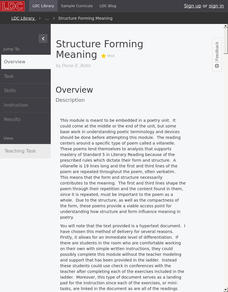Curated OER
Investigating the Harlem Renaissance
The work of Langston Hughes opens the door to research into the origin and legacy of the Harlem Renaissance and how the literature of the period can be viewed as a commentary on race relations in America. In addition, groups are assigned...
Curated OER
Producing Beats
Turn your classroom into a music studio as groups work together to determine why music sounds different when performed live versus a recording. After listening to some different music, each group picks a poem, creates a recording, and...
Curated OER
Poetic Elements Are Fun!
Engage your class in the elements of poetry with a series of lessons and activities. The plans cover simile, metaphor, personification, onomatopoeia, alliteration, and imagery. Learners come up their their own metaphors, identify poetic...
Curated OER
Performance-Based Assessment Practice Test (Grade 4 ELA/Literacy)
Track the progress of your fourth graders' reading and writing skills with this practice Common Core assessment. Based on a collection of six reading passages that include narrative stories, poetry, and a series of informational...
Oklahoma City of Museum Art
Harlem Renaissance
Individuals expressed the Harlem Renaissance in diverse forms of art, ranging from poetry to photography to painting. Learners explore pieces using a carefully curated collection from the Oklahoma City Museum of Art. Included lessons ask...
EngageNY
Grade 11 ELA Module 2: Unit 2, Lesson 9
How do authors employ specific word choices to describe complex relationships? Scholars read and analyze the first stanza from Audre Lorde's contemporary poem "From the House of Yemanjá." Pupils determine the meanings of figurative and...
EngageNY
Looking Closely at Stanza 1—Identifying Rules to Live By Communicated in “If”
Here is a lesson plan in which pupils connect themes and rules to live by from the story Bud, Not Buddy by Christopher Paul Curtis to those found in the poem If by Rudyard Kipling. First, scholars discuss their reading and review Bud's...
EngageNY
Introducing “If” and Noting Notices and Wonders of the First Stanza
After reading chapter 14 of the story Bud, Not Buddy by Christopher Paul Curtis, scholars take part in a read-aloud of the poem If by Rudyard Kipling and compare it to the reading of Bud, Not Buddy. Learners then go deeper into the poem...
National Gallery of Art
The First African American Regiment
Young historians examine a memorial sculpture of the first African American regiment in the Civil War, and then compare how the experiences of the regiment are portrayed in letters and poetry, as well as in the motion picture, Glory.
K12 Reader
Different Perspectives: The American Revolution
Prompt your young historians to hone in their reading comprehension skills by considering the fascinating perspective that Rudyard Kipling offers in his poem, "The American Rebellion", which provides an alternative perspective toward the...
Pearson
Langston Hughes
An author study provides learners the opportunity to explore in depth the life of, the influences on, and the works of a single literary figure. Introduce middle schoolers to Langston Hughes with a unit that models how to approach an...
EngageNY
Grade 11 ELA Module 2: Unit 2, Lesson 10
Audre Lorde's poem "From the House of Yemanjá" describes the speaker carrying two women on her back—she must be strong! Pupils read the second stanza using instructional activity 10 of 14 from the Grade 11 ELA Module 2: Unit 2 series....
Facing History and Ourselves
Responding to Difference in Democracy
Disagreements happen in a diverse democracy. It's what people do about these differences in a diverse society that the resource models. After listening to an eight-minute podcast about a woman who collaborated with people who have very...
Academy of American Poets
The Immigrant Experience
The Buttonhook by Mary Jo Salter is the focus of a unit that explores the immigration experience to Ellis Island. First, scholars bring in an artifact that represents their heritage. A group-exercise allows them to share and discuss...
Read Works
A Bird Came Down the Walk
"A Bird Came Down the Walk" by Emily Dickinson is the focus text of a narrative poetry-based reading comprehension worksheet. After reading her poem, young readers respond to seven multiple choice and three short answer questions. The...
Robert Frost Farm
“Choose Something Like a Star” Discussion—Applying Style to Content
Robert Frost's "Choose Something Like a Star" and John Keats' "Bright Star" provide the text for a two-part instructional activity in which class members analyze the effects of style on meaning in poetry. Randall Thompson's song cycle...
Literacy Design Collaborative
Structure Forming Meaning
Teach literary lovers how to form opinions about form. Scholars read
informational text about the form used in villanelles. After analyzing
the structure used in the poetry with graphic organizers and gallery
walks, writers create...
Texas Education Agency (TEA)
Annotate and Analyze a Paired Passage: Practice 1 (English II Reading)
What do a colt and a boy in a tree have in common? More than might be first apparent. The fourth interactive in a series of ten introduces readers to intertextuality, the process of using abstract thinking to consider how one text...
Curated OER
Review Steps in the Writing Process and Explore a Poem
Students practice their persuasive writing skills. For this writing process lesson, students write essays that meet the requirements of the included text element worksheets and analyze poetry of their choosing.
Brethren High School
Romanticism Through the Eyes of Art, Poetry, and Technology
Use this simple collaborative activity to introduce the definition, art, and poetry of romanticism. Educators will have to provide the poetry, images of the art, and the survey for the learners, but by using this resource, they won't...
Curated OER
Understanding Poetry
Students search the Internet to find a poem to research, analyze and present their interpretation of the poem to the class. They develop their interpretation in Microsoft Word and PowerPoint.
Curated OER
Atmosphere and Symbolism in Poetry
Analyzing atmosphere and symbolism by focusing on a well-known poem, The Raven, is the strategy presented to writers in this presentation. Sorrow, darkness, and many other image words are used to help students question and analyze poetry...
Curated OER
Prairie Poetry
Ninth graders take note of the ways in which word choice, rhythm, language and narrative voice, as well as point of view in a poem can be used to evoke a time and place. They use their insights to create a poem of their own.
Curated OER
Creature Feature Poetry Keyword Search!
Young scholars examine the differences between fact and opinion, and brainstorm ideas for a keyword list by analyzing facts. They listen to poems, and create posters listing three keywords about each creature featured in the poetry.
Other popular searches
- Analyze Poetry
- Analyze Poetry Third Grade
- Analyze Symbolism in Poetry
- How to Analyze Poetry
- Analyze Imagery in Poetry

























